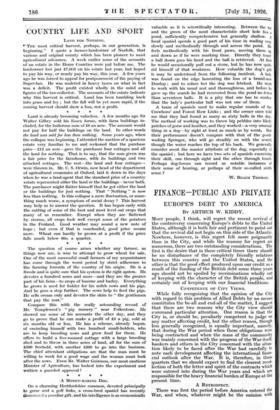The question of course arises whether any farmer, as things
now are, is wise to attempt to grow wheat for sale. One of the most successful small farmers of my acquaintance has come through the worst period by strict adherence to the farming formula of the country of his origin. He is a Swede and is quite sure that his system is the right system. He devotes a hundred acres and more—and they are the greater part of his farm—to crops of lucerne and barley. Everything he grows is used for fodder for his milch cows and his pigs. And he goes a step further. The cows help to feed the pigs. He sells cream only and devotes the skim to " the gentlemen that pay the rent."
Compare this with the really astounding record of Mr. Templewest's " pig nursery " near Folkestone. He showed me some of his accounts the other day, and they go to prove that he can make a profit of £3 a pig, sold at six months old or less. He hiss n scheme, already begun, of encircling himself with two hundred small-holders, who are, to keep breeding sows and grow food for them. He offers to build a five-roomed cottage with a large breeding shed, and to throw in three acres of land, all for the sum of £500 freehold, with another £500 to go into the business. The chief attendant obligations are that the man must be willing to work for a good wage and the woman must look after the sows. Even Mr. Walter Guinness, our most cautious Minister of Agriculture, has looked into the experiment and written a guarded approval I -


































 Previous page
Previous page